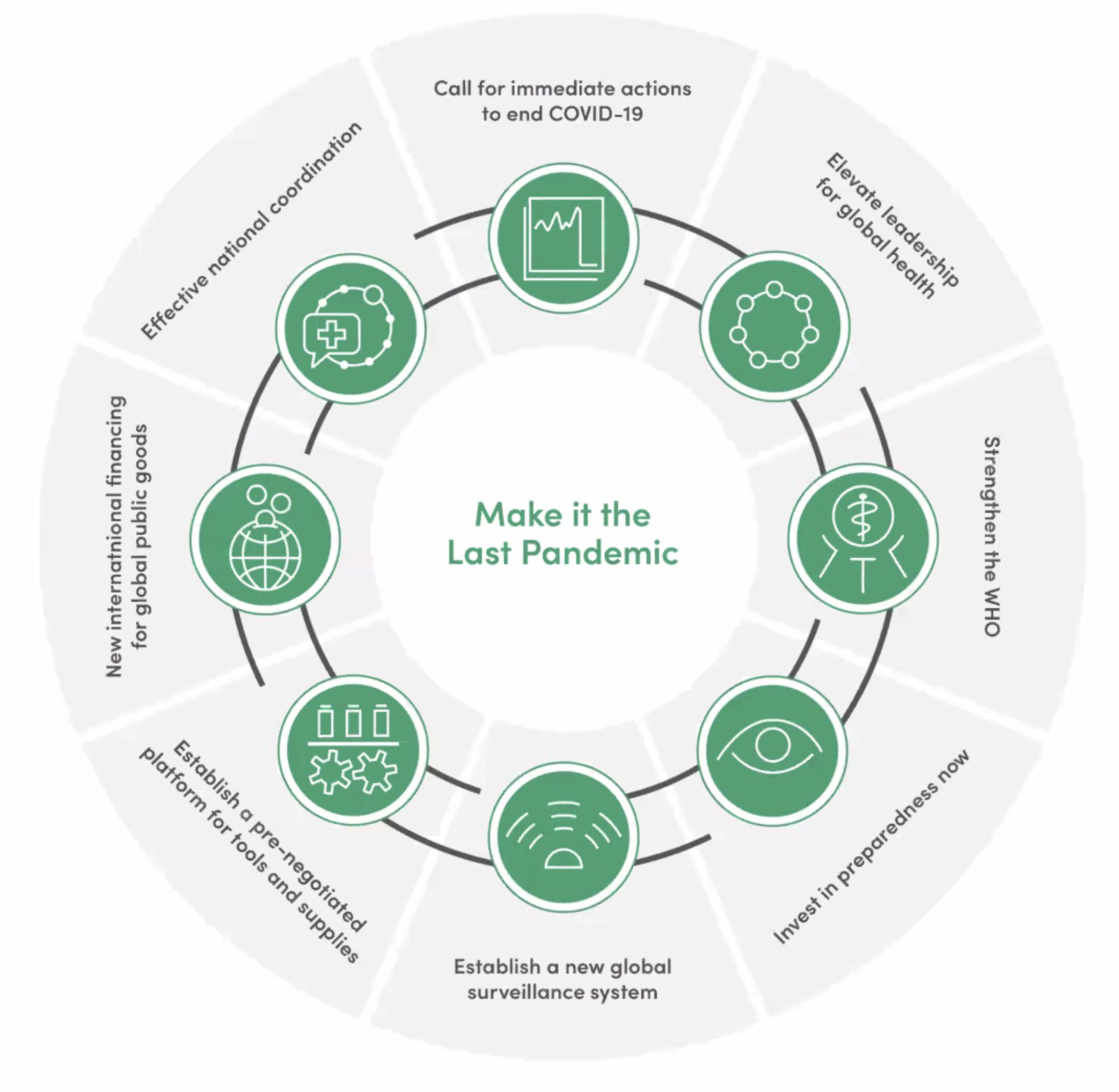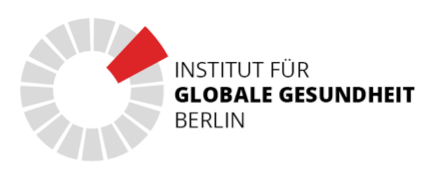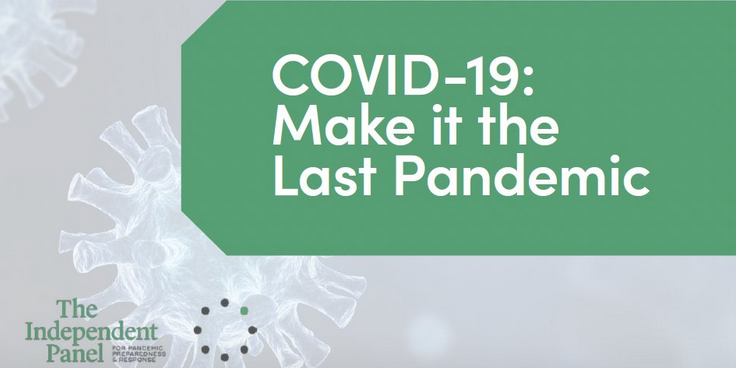Das Independent Panel on Pandemic Preparedness and Response fordert in seinem Abschlußbericht die Weltgemeinschaft auf, die COVID-19-Pandemie gemseinsam und solidarisch zu beenden und eine Reihe mutiger und wesentlicher Reformen zu verabschieden, um die nächste Krise zu verhindern. Das unabhängige und hochranging besetzte Independent Panel wurde im Juli 2020 durch den Generaldirektor der WHO, Dr Tedros Ghebreysus, im Auftrag der Weltgesundheitsversammlung (WHA73) ins Leben gerufen. Mehr Information zum Panel finden Sie hier.
Dr. Mathias Bonk, 1. Vorsitzender des IGGB, hat als Projekt Manager die Arbeit des Independent Panel aktiv mitgestaltet.

Pressemitteilung des Independent Panel:
GENEVA –12 May 2021
A panel of leading experts is today calling on the global community to end the COVID-19 pandemic by immediately implementing a series of bold recommendations to redistribute, fund, and increase the availability of and manufacturing capacity for vaccines, and to apply proven public health measures urgently and consistently in every country. The Panel is also recommending that national governments and the international community immediately adopt a package of reforms to transform the global pandemic preparedness and response system and prevent a future pandemic.
The Independent Panel for Pandemic Preparedness and Response (The Independent Panel) was appointed by the World Health Organization (WHO) Director-General in response to a World Health Assembly resolution calling for an independent, impartial, and comprehensive review of experiences gained and lessons to be learned from the current pandemic. The review was also asked to provide recommendations to improve capacity for global pandemic prevention, preparedness, and response. The Panel released its findings and recommendations today in its main report: COVID-19: Make it the Last Pandemic. The Panel, co-chaired by the Rt Hon. Helen Clark, former Prime Minister of New Zealand, and Her Excellency Ellen Johnson Sirleaf, former President of Liberia, has spent the past eight months rigorously reviewing the evidence on how a disease outbreak became a pandemic, and on global and national responses.
The report demonstrates that the current system—at both national and international levels— was not adequate to protect people from COVID-19. The time it took from the reporting of a cluster of cases of pneumonia of unknown origin in mid-late December 2019 to a Public Health Emergency of International Concern being declared was too long. February 2020 was also a lost month when many more countries could have taken steps to contain the spread of SARS-CoV-2 and forestall the global health, social, and economic catastrophe that continues its grip. The Panel finds that the system as it stands now is clearly unfit to prevent another novel and highly infectious pathogen, which could emerge at any time, from developing into a pandemic.
As the COVID-19 pandemic continues to devastate communities across the world, the Independent Panel is making a series of immediate recommendations to halt its spread. It recommends that:
- High-income countries with a vaccine pipeline for adequate coverage should, alongside their scale-up, commit to provide to the 92 low and middle-income countries in the COVAX Gavi Advance Market Commitment with at least one billion vaccine doses by September 2021.
- Major vaccine-producing countries and manufacturers should convene, under the joint auspices of the WHO and the World Trade Organization (WTO) to agree to voluntary licensing and technology transfer. If actions on this don’t occur within three months, a waiver of intellectual property rights under the Agreement on Trade-Related Aspects of Intellectual Property Rights should come into force immediately.
- The G7 should immediately commit to provide 60% of the US$19 billion required for the Access to COVID-19 Tools Accelerator (ACT-A) in 2021 for vaccines, diagnostics, therapeutics, and strengthening of health systems, and a burden-sharing formula should be adopted to fund such global public goods on an ongoing basis.
Every country should apply proven public health measures at the scale required to curb the pandemic. Leadership from heads of state and government to achieve this is crucial.
The world must also urgently prepare to prevent a future outbreak from becoming a pandemic. To this end, the Independent Panel calls for the engagement of heads of state and government to lead on efforts to transform the existing system. The Panel calls for a series of bold and forward-looking reforms, including:
- Establishing a Global Health Threats Council that will maintain political commitment to pandemic preparedness and response and hold actors accountable, including through peer recognition and scrutiny. Countries should also adopt a Pandemic Framework Convention within the next six months.
- Establish a new global system for surveillance based on full transparency. This system would provide the WHO with the authority to publish information about outbreaks with pandemic potential on an immediate basis without needing to seek approval and to dispatch experts to investigate at the shortest possible notice.
- Invest in national preparedness now as it will be too late when the next crisis hits. All governments should review their preparedness plans and allocate the necessary funds and people required to be prepared for another health crisis.
- Transform the current ACT-A into a truly global platform aimed at delivering global public goods including vaccines, diagnostics, therapeutics, and supplies that can be distributed swiftly and equitably worldwide—shifting from a market model to one aimed at delivering global public goods.
- Focus and strengthen the authority and financing of the WHO, including by developing a new funding model to end earmarked funds and to increase Member State fees.
- Create an International Pandemic Financing Facility, which would have the capacity to mobilize long term (10-15 year) contributions of approximately US$5-10B per year to finance ongoing readiness. It would also be ready to disburse from US$50-100B at short notice by front-loading future commitments in the event of a pandemic declaration. The Global Health Threats Council would allocate and monitor the funding to institutions which have the capacity to support the development of preparedness and response capacities.
- Heads of state and government should at a global summit adopt a political declaration under the auspices of the UN General Assembly to commit to these transformative reforms.
The Panel’s report also shared recommendations for individual countries, including that heads of state and government should appoint national pandemic coordinators who are accountable to them, and who have a mandate to drive whole-of-government coordination for pandemic preparedness and response.
The Panel is releasing the report and recommendations together, with a range of background papers which include the authoritative chronology of what happened. This is the culmination of multiple literature reviews, original research, discussions with experts in roundtables and in-depth interviews, and dialogue with those working on the front-line, with women and youth in town hall-style meetings. It also received online contributions to its work.
The Panel has consistently raised its deep concern that the burden of the current pandemic is being unevenly shared. It has had devastating social and financial consequences for those already disadvantaged. Up to 125 million more people are estimated to have been pushed into extreme poverty, while 72 million more primary school-age children are now at risk of being unable to read or understand a simple text because of school closures. Women have borne a disproportionate burden. Gender-based violence is at record levels, and child marriages have increased. In addition, the world lost US$7 trillion in GDP in 2020 – more than the 2019 GDP of the entire African continent (US$6.7 trillion). The pandemic has caused the deepest shock to the global economy since World War II.
Background
The Independent Panel was established by the World Health Organization (WHO) Director-General in response to the World Health Assembly resolution 73.1 issued in May 2020. The Panel’s Co-Chairs are the Rt Hon. Helen Clark, former Prime Minister of New Zealand, and Her Excellency Ellen Johnson Sirleaf, former President of Liberia. The Independent Panel has a total of 13 members, selected by the Co-Chairs. The Panelists have a substantial mix of skills and expertise in infectious disease, global and national health policy and financing, outbreaks and emergencies, economics, youth advocacy, and in the wellbeing of women and girls. They also share knowledge of the international system, including of WHO, and experience from similar international processes. The mission of the Independent Panel is to provide an evidence-based path for the future, grounded in lessons of the present and the past to ensure countries and global institutions, including specifically WHO, effectively address health threats. They have spent the last eight months independently, impartially, and rigorously reviewing evidence of the spread, actions, and responses to the COVID-19 pandemic. Information on the panel members can be found here. They have conducted numerous literature reviews, original research and have learned from dozens of experts in roundtable discussions and in-depth interviews. The Panel has also heard directly from people working on the front-line of the pandemic in town-hall style meetings and has invited contributions from anyone wishing to make one.
Accompanying the main report and recommendations will be a series of background papers:
- Learning from The Past
- The Chronology Including Literature Review
- From Science to Policy
- National and Sub-National Responses
- Impact on Essential Health Services
- Access to Essential Supplies
- Access to Vaccines, Diagnostics, And Therapeutics
- Understanding Communication
- Community Involvement
- International Treaties and Conventions
- WHO – An Institutional Review
- The Economic Impact
- The Social Impact
- Human Rights
These are available publicly through the Independent Panel website.

